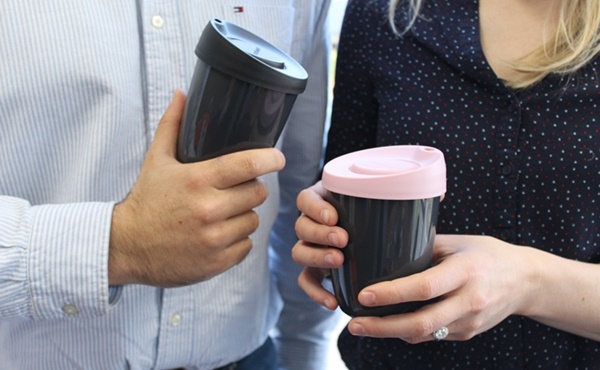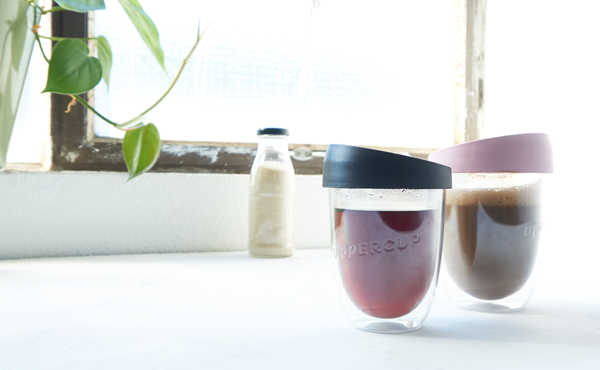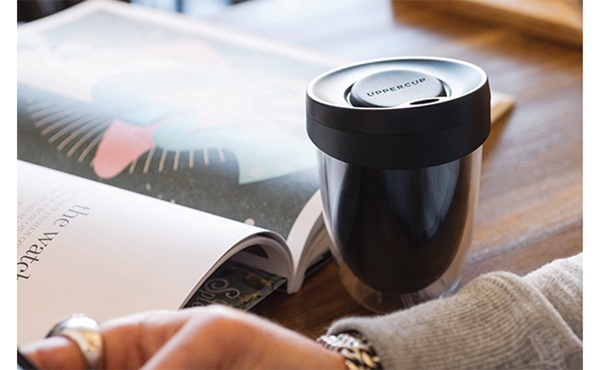We sat down and had a chat with Felicity Ford from Uppercup, a small female-led, Australian made and owned, B-Corporation certified business.
We love how Uppercup provides real solutions to wider environmental issues. Why was creating the Uppercup Solutions Program and the Recycled Uppercup Plus product important to your businesses core values and ethics?
“We strive to be as sustainable as possible while maintaining a minimal impact on the environment, people and society around us. Reusable coffee cups have now been an integral part of Australian society for the past five years, you see them everywhere.
What we were noticing was that people were now onto their second or third reusable cups, as all cups have an end of life. On top of offering spare parts to extend product life, we wanted to provide an option to all customers to know that their product is actually being recycled.
In Australia we have a large problem with reclamation and recycling of products, so we have been working hard to make sure we are minimising our impact on our local environment. Because of the issues around recycling and repurposing we decided to work with local partners to recycle the cups ourselves and turn them into new ones.”
How does Uppercup work to eradicate single use coffee cups from circulation and landfill?
“Beyond selling cups to people, we have a suite of partners who we are working with to implement alternative based cup systems. One is a Swap & Go Cup program where we implement a suite of different cups in corporate head offices and allow every single staff member to borrow a made-to-order Uppercup and return it.
Why our programs are so effective at eradicating single-use coffee cups is that they are made-to-order for commercial applications. You can brand and match to the company plus you can fit a non-reusable lid on the cup, which is the part of the non-reusable coffee cup that can be recycled. You are removing the barrier to entry of not having to remember a cup, as you can always get one and take back your reusable cups at another time. Remembering a cup is often something people struggle with when going out for a coffee. The idea of the program is that they can always pick up a reusable cup and return it when they are ready.”
Supporting Australian jobs and manufacturing seems to be a key component to the business structure of Uppercup. How do you ensure that all your suppliers work within a 25km radius of your head office? What suppliers does this include?
“Printing, packaging, raw material, employees, warehousing, distribution and manufacturing. We are lucky enough to work within a metro Victorian business hub, where most of our supporting suppliers have been around for over 35 years.
We find small choices around using local suppliers, makes a big difference to our local community. In an example, one job we did directly hired over 25 people and that doesn’t take into account our suppliers of materials. Supporting local suppliers really impacts the community and Australia’s economy, as every business pays taxes here.”
Tell us more about the female leaders of Uppercup who are pioneering such responsible and ethical business procedures that make Uppercup more than just a business.
“We are passionate young women who are striving to make a difference not just within the sustainability goods sector but also within manufacturing in Australia. We want to be a part of the revolution of reusable product systems being implemented and made locally in Australia over the next 10 to 20 years.
We see a fantastic opportunity for responsible and ethical business to be located in Australia. Our focus, resilience and determination to build a sustainable, ethical, but strong business is the backbone of everything we do. We are continually evolving and build upon initiatives, and new ideas as opportunities are presented.”
How do you manage and juggle running a business with personal and family commitments?
“The constant juggle is most definitely how we would describe our lives. For us, we wouldn’t have it any other way. But we have become strong in owning a life that works for our family. An example of this choice is that my husband and I choose to co-parent, which means we strive to have 50 per cent of the work done by each of us. When we had our daughter, we had the opportunity to both take primary carer parental leave of three months each. We found this was an excellent opportunity for both parents to bond plus it allowed me to step out of my business briefly and integrate back in sooner.”
What does it mean to Uppercup to be involved in a circular economy?
“All good things must come to an end and this includes our cups. The question was, what is happening to our reusable cups once people are finished with them? We are committed to lowering any impact we have on the environment and this includes the post-purchase environmental effects we are having with our products. So we came up with Uppercup Plus―a cup made out of recycled Uppercups.
This is a circular-economy solution―we offer a return program to any client and use those returned cups to recreate or repropose and recycle our products, meaning nothing ends up in landfill. The best part about this is all can be done locally, creating more jobs and cutting down the waste that goes into our local eco-system.”
Where did the idea for Uppercup Plus come from? How does the process work?
“The idea of Uppercup+ comes from when we wanted to take the next step in being a sustainable company. We already offered spare parts, which meant that if you broke one part of a product, you could replace it, rather than buying an entirely new product. Also, all of our products can be recycled in peoples recycling bins. However, as it became more and more apparent that Australia has issues with recycling, we wanted to find a solution that would mean our Uppercup’s at the end of life would be recycled.
Less than 60 per cent of your recycling waste is recycled. Meaning that even if you place something in a recycling bin, it will probably still end up in landfill. One of our main goals as a business is to make it easy for everyone to reduce―reuse―recycle.
We are committed to closing the loop and recycling old Uppercup’s at the end of life. Recycling old Uppercups means that we have created a closed-loop solution, where old Uppercups can be recycled and reused. It is a closed-loop solution. Your old cup won’t end up in landfill but will be recycled locally and made into a new Uppercup+ ready to be used again.

What advice would you give to other businesses wanting to create a positive impact on society and the environment?
“Supply chain, supply chain, supply chain. The companies you choose to receive services and goods from have a huge impact on how ethical and sustainable your business is.
Everything we do focuses on our three pillars: minimisation of environmental impact, ethical products and community focused supply. Accept that it is going to be tough, for us manufacturing overseas would be cheaper although the reward for us is so much more significant to produce locally, from control, relationships and community impact we have locally. Choose to work on becoming a certified B-Corporation. This certification highlights companies that meet a high level of ethical and sustainable business.”

In your opinion, what are the greatest challenges facing Australian small businesses and start-ups?
“Most support in the start-up ecosystem is based on technology start-ups and access to capital for a business that isn’t tech-based is much more limited to traditional streams.”

What motivates you and the staff at Uppercup?
“Being able to see the people that we are supporting through creating jobs and investing in local supply chains. To produce a product range that directly has waste minimisation outcomes and implements reusable systems, which support local and ethical supply chain. We can directly support people in our community. We exist to help companies navigate and implement the process of removing single-use food and beverage containers from our customer’s supply chain.
We are motivated by removing non-reusables from society, as each reusable cup makes a difference to the environment. By implementing made to order solutions at head offices, café or in your own life, there is a tangible and impactful waste minimisation outcome that those companies can easily track.”








